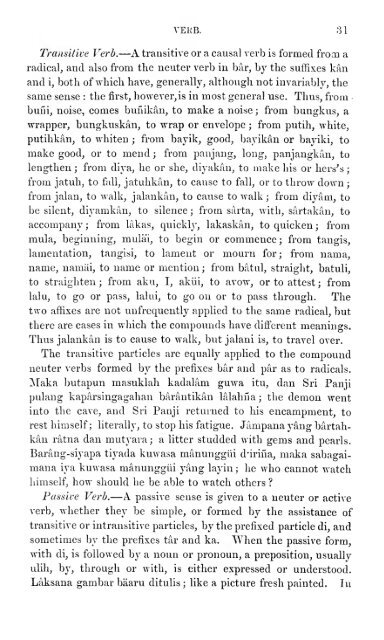A grammar and dictionary of the Malay language : with a preliminary ...
A grammar and dictionary of the Malay language : with a preliminary ...
A grammar and dictionary of the Malay language : with a preliminary ...
You also want an ePaper? Increase the reach of your titles
YUMPU automatically turns print PDFs into web optimized ePapers that Google loves.
VERB. 31<br />
Transitive Verb.—A transitive or a causal verb is formed from a<br />
radical, aud also from <strong>the</strong> neuter verb in bar, by <strong>the</strong> suffixes kan<br />
<strong>and</strong> i, both <strong>of</strong> which have, generally, although not invariably, <strong>the</strong><br />
same sense : <strong>the</strong> first, however,is in most general use. Thus, from •<br />
buiii, noise, comes bunikan, to make a noise ; from bungkus, a<br />
wrapper, bungkuskan, to wrap or envelope ; from putih, white,<br />
putihkjin, to whiten ; from bayik, good, bayikan or bayiki, to<br />
make good, or to mend ; from panjang, long, panjangkan, to<br />
leng<strong>the</strong>n ; from diya, he or she, diyakan, to make his or hers's<br />
from jatuh, to fall, jatuhkan, to cause to fall, or to throw down;<br />
from jalan, to walk, jalankan, to cause to walk ; from diyam, to<br />
be silent, diyamkan, to silence ; from siirta, <strong>with</strong>, sartakan, to<br />
accompany; from lakas, quickly, lakaskan, to quicken; from<br />
mula, beginning, mulaii, to begin or commence; from tangis,<br />
lamentation, tangisi, to lament or mourn for; from nama,<br />
name, namiii, to name or mention ; from batul, straight, batuli,<br />
to straighten ; from aku, I, akiii, to avow, or to attest ; from<br />
lalu, to go or pass, lalui, to go on or to pass through. The<br />
two affixes are not unfrequently applied to <strong>the</strong> same radical, but<br />
<strong>the</strong>re are cases in which <strong>the</strong> compounds have different meanings.<br />
Thus jalankan is to cause to walk, but jalani is, to travel over.<br />
The transitive particles are equally appHed to <strong>the</strong> compound<br />
neuter verbs formed by <strong>the</strong> prefixes bar <strong>and</strong> par as to radicals.<br />
Maka butapun masuklah kadalam guwa itu, dan Sri Panji<br />
pulang kaparsingagahaii barantikan lalahiia ; <strong>the</strong> demon went<br />
into <strong>the</strong> cave, <strong>and</strong> Sri Panji returned to his encampment, to<br />
rest himself; literally, to stop his fatigue. Jampana yang bartahkan<br />
ratna dan mutyara; a litter studded <strong>with</strong> gems <strong>and</strong> pearls.<br />
Barang-siyapa tiyada kuwasa manunggiii d'iriua, maka sabagaimana<br />
iya kuwasa manunggiii yang layin ; he who cannot Avatch<br />
himself, how should he be able to watch o<strong>the</strong>rs ?<br />
Passive Verb.— A. passive sense is given to a neuter or active<br />
verb, whe<strong>the</strong>r <strong>the</strong>y be simple, or formed by <strong>the</strong> assistance <strong>of</strong><br />
transitive or intransitive particles, by <strong>the</strong> prefixed particle di, <strong>and</strong><br />
sometimes by <strong>the</strong> prefixes tar <strong>and</strong> ka. When <strong>the</strong> passive form,<br />
<strong>with</strong> di, is followed by a noun or pronoun, a preposition, usually<br />
tJih, by, through or <strong>with</strong>, is ei<strong>the</strong>r expressed or undei'stood.<br />
Laksana gambar baaru ditulis ; like a picture fresh painted. In<br />
;

















